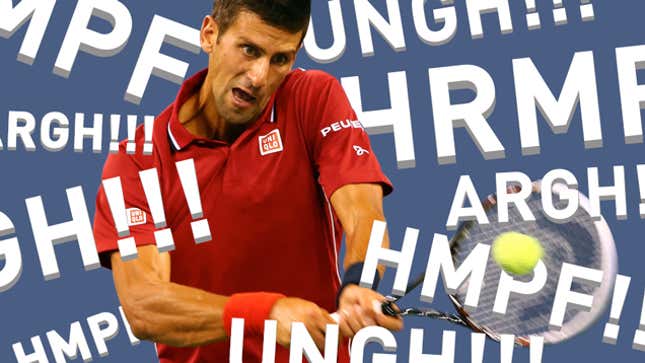
Monica Seles gets the blame—at 93 decibels, her screams on the court were about as loud as a motorcycle, and started the run on grunting in tennis. It was frowned upon at first, but everyone's climbed on board—Djokovic, Nadal, Sharapova, Serena, and Venus, they all get their shriek on. A generation ago, nobody grunted. Now, all the top players do it. Why?
Conventional wisdom says that players grunt because it allows them to hit the ball harder. It's kinda like performing a bench press—the grunt helps a bro max out—or in the case of tennis, it helps a player apply maximal force when racket meets ball. (Martina Navratilova said grunting is "cheating, pure and simple" and has to stop1). Maria Sharapova's screams routinely top 100 decibels—roughly equivalent to a chainsaw or jackhammer—and some believe it's why she's able to hit the ball much harder than the average player on tour. Dr. Victor Thompson, a clinical sports psychologist, explained: "If there is a forceful exhalation of air at the same time that the core abdominal muscles engage it may give more power. This is why in sports where maximal power is required—such as shot put or javelin—there will always be a grunt." That makes some sense, but wouldn't that be rather exhausting for an endurance sport like tennis?
Maybe not as much as you'd think. In a recent study, ten Division I tennis players (five men, five women) were asked to hit forehand and backhand shots while either grunting or not grunting. Each hitting session consisted of five 2-minute periods with a 1-minute break in between. During the experiment, players wore a portable device that measured metabolic activity while ball velocity was measured with a radar gun. Interestingly, heart rate and oxygen consumption for the two hitting conditions weren't significantly different. But ball velocity was. When players grunted, they hit the ball nearly 4 percent harder. Grunting, researchers discovered, allowed players to hit harder without having to work harder.
In addition to the physiologic benefits of screaming, there appear to be psychological advantages. Vigorous grunting can help a player relax and release tension. The intense sounds may also intimidate an opponent. And that brings us to an oft-overlooked aspect of this story. A lot of ink has been spilled describing the potential benefits for the one doing the grunting, but very little has been written about what those howls do to an opponent's psyche. It has to mess with the opposing player's head, right?
The answer appears to be yes. In a one study, investigators explored the detrimental effects of grunting on reflexes and decision-making, and the results were striking. Participants were shown videos of a tennis player hitting a ball to either side of a tennis court and were asked to respond as quickly as possible, indicating where the shot was going. For half the videos, the shots occurred in silence; for the other half, a brief sound—60 decibels for half a second—occurred at the same time as contact, mimicking the sound of a tennis grunt.
The researchers discovered that the presence of an extraneous, jarring sound interfered with a participant's performance, making responses both slower and less accurate. Sound caused study subjects to respond 21 to 33 milliseconds slower, and they were 3 to 4 percent less accurate at predicting where the ball was going. Over the course of a tennis match, these little things add up.
These results dovetail with laboratory research that has shown that when two objects collide, the sound of that collision is critical to the perception of one item bouncing off the other. In short, sound alters visual motion perception. Which means that screamers can really mess with an opposing player's mind, creating sounds so loud and disorienting that it momentarily short-circuits the players' parietal lobe, the area of the brain responsible for attention. Even if an opponent is able to hear the sound of the ball hitting the racket, the grunt may draw auditory attention away from the sound of the ball and toward the sound of the grunt. The sound may also draw visual attention away from processing the event of the ball leaving the racket, similar to how a cell phone conversation interferes with one's ability to attend to traffic on the road (i.e. one looks at the traffic but does not see it correctly). Grunting is not just about hitting the ball harder.
It's odd to imagine the best athletes in the world getting distracted by noise, but they really have no choice. It's just the way human brains are wired. Whether the grunters know it or not, they are fundamentally altering the way opponents perceive their shots every time they let out one of those hideous screams. And this is exactly what Navratilova was getting at. Her argument against grunting centered around the idea that it was important to hear the ball strike the racket, and that a grunt could mask or distract attention from this important moment. Now there's unequivocal scientific evidence to support her concern.
But if everyone does it, should we care?
1The International Tennis Federation states that purposeful and excessive grunting is a hindrance and reason for a point penalty.
Matt McCarthy is an assistant professor of medicine at Weill Cornell Medical College in Manhattan. You can follow him on Twitter here.
Image by Sam Woolley